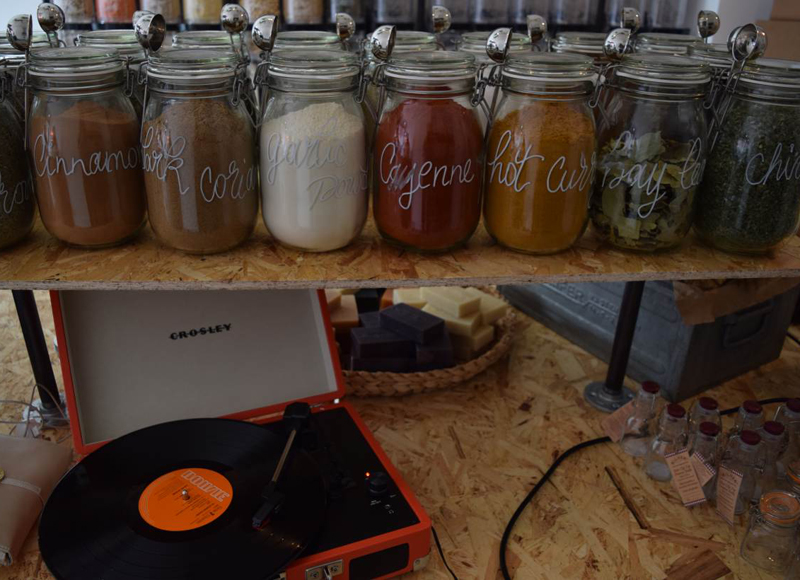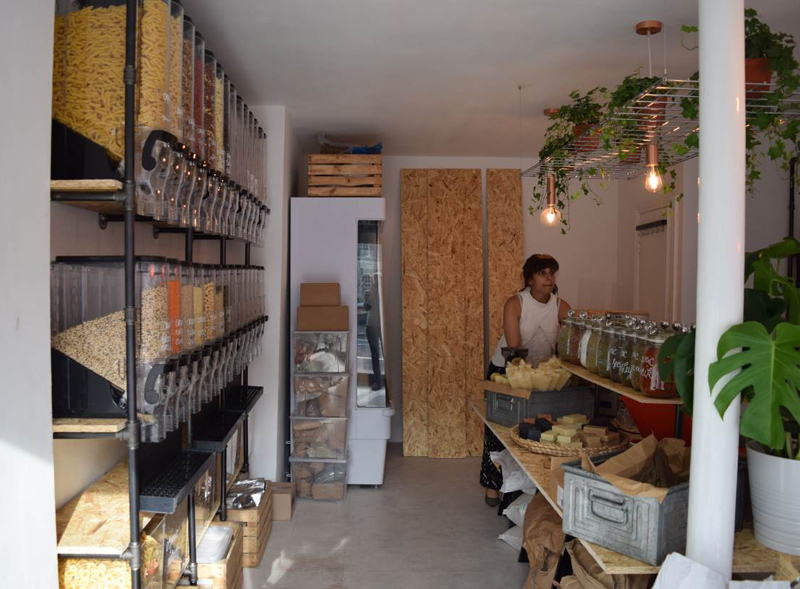
ANNA-PUJOL MAZZINI, of Thomson Reuters Foundation, reports on the trend for package-free shops…
When Ingrid Caldironi decided to start living a more eco-friendly lifestyle, she made a few changes to her routine.
Ms Caldironi bought a reusable coffee cup, started making her own beauty products and tried to stop buying packaged products.
But she soon hit a wall.
Most British supermarkets sell few unpackaged products, and she was spending most of her weekends roaming London in search of loose vegetables and bulk coffee.
So she decided to open her own shop: the only “zero-waste” store in London, which sells foods in bulk, products made out of waste and durable alternatives to typical throwaway products such as plastic cutlery, razors and sponges.

Spices are displayed in the new Bulk Market store in east London, August 24. PICTURE: Thomson Reuters Foundation/Anna Pujol-Mazzini
TAKING AIM AT FOOD WASTE, COMPANIES PLAN TO SIMPLIFY EXPIRATION LABELS
Some of the world’s largest consumer goods companies including Kellogg Co and Wal-Mart Stores Inc said this week they will simplify food expiration labels in an effort to eliminate confusion that contributes to food waste.
Standardised labeling will use a single expiration date on perishable items and a single quality indicator for non-perishable items, the Consumer Goods Forum (CGF) announced.
Confusion over expiration labels costs families up to $US29 billion annually in the United States alone, according to CGF, which represents some 400 of the world’s largest retailers and manufacturers from 70 countries.
According to the United Nations’ Food and Agriculture Organization, there is enough food to feed the world’s population but one third is wasted.
Labels now in use such as “Sell by,” “Use by” and “Best before” were developed beginning in the 1960s to increase consumer safety but have multiplied, Ignacio Gavilan, a CGF spokesman, told the Thomson Reuters Foundation.
“Now now we have the 12 or 15 expressions that we have today,” he said.
Since most countries have no laws regulating labeling, its arbitrary use by companies has led to widespread confusion among consumers, experts say.
“The tendency of the consumer is if they get confused, they throw it away,” said Mr Gavilan.
“There may be two dates and one of them is close, so they just say ‘Well, why risk getting sick?'”
Consumers account for some 40 per cent of the world’s food waste, Mr Gavilan said.
Simplified, consistent date labeling will help companies halve food waste by 2025, said Peter Freedman, CGF managing director.
Under the new plan, only two labels – “Best if used by” for non-perishable items and “Use by” for perishable ones – will be used by CGF members by 2020.
The CGF includes most of the world’s consumer goods giants from Tesco Plc to Campbell Soup, Nestle SA and Unilever Plc.
A report last year by ReFED, a non-profit that works with companies to cut food waste, said standardized labeling was one of the most cost-effective ways to address the issue.
“This low lying-fruit of date labeling standardization is exactly the type of solution that everyone can agree is fairly low-effort, cost-effective and has a positive impact on reducing consumer confusion which ultimately helps to reduce food waste,” Eva Goulbourne, a ReFED spokeswoman, told the Foundation.
The announcement was made at an event held by Champions 12.3, a group established to promote the UN’s Sustainable Development Goal (SDG) of cutting food waste and losses by 2030.
– SEBASTIEN MALO and UDAY SAMPATH, Thomson Reuters Foundation
“I want to help people understand that it’s not difficult to be sustainable,” Ms Caldironi told the Thomson Reuters Foundation at her store, Bulk Market, in east London.
“When people change their behaviours, and they start demanding something different, then companies will need to change,” she added.
Bulk Market opened last week and sells everything from rice to dog food to cakes, catering for customers who want to leave no trace with their consumption.
It currently serves about 50 people a day, from young families to older customers, in a small, white-walled store lined with glass bins, wooden tables and wicker baskets.
As Ms Caldironi talked, she sipped sparkling water infused with wonky cucumbers – destined for landfill due to their shape – in a can made of aluminium, a widely recycled material.
Dozens of similar, package-free shops have opened across the world, from Copenhagen to Montreal, as a response to mounting concerns about plastic pollution and food waste.
According to researchers, humans have produced more than eight billion tons of plastic since the 1950s, with most of it discarded in landfills or the wider environment, hurting ecosystems and human health.
Most of the plastics that do get recycled – less than 10 per cent of the total – can only be recycled once before they too end up in landfills, while other materials such as the aluminium used in drink cans can be recycled indefinitely.
Packaging is the largest market for plastic and the petroleum-based product accelerated a global shift from reusable to single-use containers, researchers said.
Fed up with how government and business are responding to the climate change emergency, a fast-growing group of individuals is taking matters into its own hands.
Enter Bea Johnson, a California-based French blogger who rose to fame after she cut the yearly waste produced by her family of four to a single jar and published a guide to living waste-free.
“Recycling is not the solution to our environmental problems, Johnson told the Thomson Reuters Foundation in a phone interview. “It depends on way too many factors to be efficient.”
Instead, Ms Johnson focuses her efforts on waste prevention, using five rules: refuse what you do not need, reduce what you own, reuse items instead of buying disposables, recycle only what you cannot refuse, reduce or reuse, and compost the rest.
Some of the main staples of the zero-waste lifestyle include bamboo toothbrushes, which can be composted, and stainless steel straws, paper towels and reusable sanitary products which do not need to be replaced as often as their throwaway counterparts.
A plethora of zero waste bloggers also provide recipes explaining how to use commonly thrown-away foods, such as bananas, broccoli stalks or stale bread.
The bulk containers provided in zero-waste stores such as Bulk Market allow customers to refill their own jars with the exact quantity of beans, spice or oil they need, cutting waste.
In Britain, an estimated seven million tonnes of food and drink are thrown from homes each year, costing an average household about £470 ($US604.89) a year, according to the Food Standards Agency, a government body.
Some EU countries, including France and Italy, have already adopted national measures to fight food waste.
Britain still has among the lowest levels of food redistribution, whereby out-of-date but edible food is redistributed to people in need via charities and food banks.

Ingrid Caldironi’s sets up her new store Bulk Market in east London. PICTURE: Thomson Reuters Foundation/Anna Pujol-Mazzini
Ms Caldironi, a former marketing executive, also hopes to support local social enterprises such as Toast Ale, which makes beer out of surplus bread and Luminary Bakery, which employs female former inmates.
“My place is going to be a place to show people you can have a different way of shopping – you can have a normal life, you don’t need to change so much,” Ms Caldironi said.
But although the emphasis is on the impact small changes can have on the environment, many zero-waste advocates say the shift to a “circular economy” – which means re-using products and materials, producing no waste and pollution, and using fewer new resources and energy – can only be achieved with the help of businesses and governments.
“Citizens are making a big difference but it can’t all be on the shoulders of citizens,” Ariadna Rodrigo, product policy campaigner at Brussels-based advocacy group Zero Waste Europe, told the Thomson Reuters Foundation.
“You need a change across the whole idea of how business is done.”





